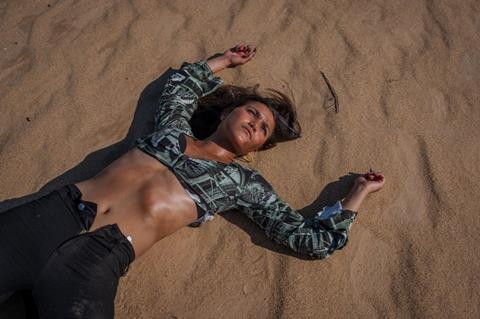Writer/Director Campbell X’s second feature is his second LGBTQ+ relationship movie. Unfortunately, it’s also a somewhat artificial narrative with an unsatisfactory ending.
Having recently lost her mother, mixed-race Londoner Quinn travels to South Africa to track down her absentee father. She hasn’t seen him since she was young enough to hear his bedtime stories and her single clue to his whereabouts is on the back of a postcard which leads her on a precarious breadcrumb trail. To travel across the country, she enlists the help of streetwise local, Harley, whom she meets briefly in a nightclub, and who is hoping that Quinn’s request might be a precursor to romance. Unfortunately, as Quinn says of herself, she’s more of a hit it and quit it kind of girl. Needless to say, the road trip and the relationship between the two protagonists goes anything but smoothly.
The film makers show South Africa in all its glory, the lingering racism, the entrenched poverty, and the exquisite beauty. The setting helps to give some originality to a less than inventive premise. If the director’s aim was making the audience want to visit the country, then he’s likely succeeded, although unlike Harley and Quinn they’re sure to be sticking firmly to the tourist routes.
Unfortunately, there’s little chemistry between the two leads. Emma McDonald’s performance as Quinn feels forced much of the time. Her co-star Thishiwe Ziqubu fares a little better, within South Africa they’re something of a rising star, but it’s just too difficult to buy into them falling in love.
The approach to the narrative is also rather simplistic. Quinn’s obvious daddy issues are eventually resolved in a single night with a witch doctor. There are several riffs on other films that don’t feel as ironic as they should do. While there are some amusing moments of cross-cultural confusion from Quinn, the film is rather linear, lacking in fully developed subplots and characters, and with some cringey attempts at magical realism. The direction also feels forced although the action seems to settle as the narrative progresses, as if the film was shot chronologically and it took the first week or two for the crew to relax.
There are some thoughtful moments around race; both Harley and the audience are surprised when Quinn reveals that her father is a white African, making us question our assumptions. The film illustrates what life for people of all races, including white, is like in modern day South Africa.
However, this isn’t enough to save this somewhat clumsy film. The writer/director may go on to better things, but this is not it.
Screened as part of Edinburgh International Film Festival 2025


Comments